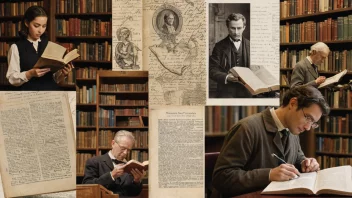Classic literature can often feel intimidating, yet it offers readers an unparalleled journey through time, culture, and human emotion. To appreciate the beauty of classic prose, one must approach these texts with curiosity and an understanding of their significance. Here’s how to cultivate a deeper connection with classic literature.
Firstly, consider the artistry of storytelling. Classic authors like Mark Twain, Virginia Woolf, and F. Scott Fitzgerald crafted narratives that delve into the complexities of human experience. Their ability to create vivid characters and intricate plots is a testament to the timelessness of their work. Take the time to analyze character motivations, plot developments, and thematic elements. What can you learn about society, morality, and the human condition through their stories?
Moreover, the language used in classic prose deserves special attention. Authors often employed elaborate language and intricate sentence structures, which can enhance the reading experience. When reading a novel like 'Moby-Dick,' immerse yourself in Melville’s descriptive prose. The way he paints images of the sea and its creatures can evoke powerful emotions and transport you to another world.
Another way to appreciate classic prose is to explore its cultural and social contexts. Classics often reflect the values, struggles, and aspirations of their times. For instance, reading 'The Scarlet Letter' by Nathaniel Hawthorne provides insight into the Puritanical society of 17th-century America, exposing themes of sin, guilt, and redemption. Understanding these backgrounds can deepen your connection to the story and its characters.
Engaging with classic literature can also be enriched through supplemental materials. Many classics have extensive commentaries, analyses, and critical essays available. Reading these can offer different perspectives and interpretations, helping you grasp the nuances of the text. Additionally, exploring biographical information about the authors can reveal how their life experiences influenced their writing.
Incorporating audio-visual elements can also enhance appreciation. Audiobooks can bring classic prose to life through skilled narration, while film adaptations can offer a fresh perspective on the original text. Watching adaptations of 'Pride and Prejudice' or 'To Kill a Mockingbird' can make the stories more relatable and enjoyable, sparking a desire to read the original works.
Lastly, remember that the journey of reading classic literature is subjective. Not every classic will resonate with every reader, and that’s part of the beauty of literature. Explore different genres and styles within the classic category—from the romanticism of the Brontë sisters to the existential musings of Dostoevsky—and find what speaks to you. If a particular work feels overwhelming, don't hesitate to set it aside in favor of something that captivates your interest.
In summary, appreciating the beauty of classic prose involves immersing yourself in the storytelling, analyzing language, understanding cultural contexts, utilizing supplemental materials, and engaging with adaptations. By embracing these strategies, readers can discover the profound richness that classic literature holds, fostering a lifelong love for the written word. Classics are more than just old books; they are gateways to understanding ourselves and the world around us.
Finding Joy in Classic Literature
Discover how to cultivate a deeper connection with classic literature and appreciate its timeless beauty.






